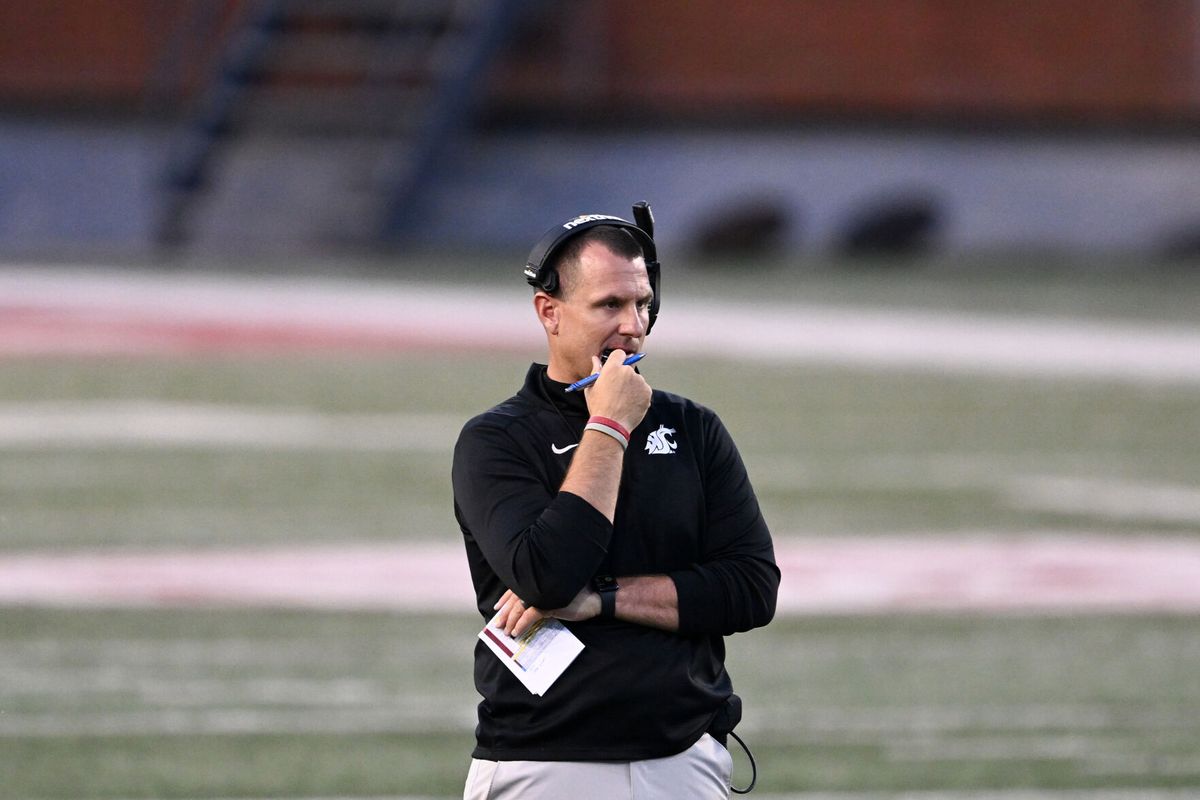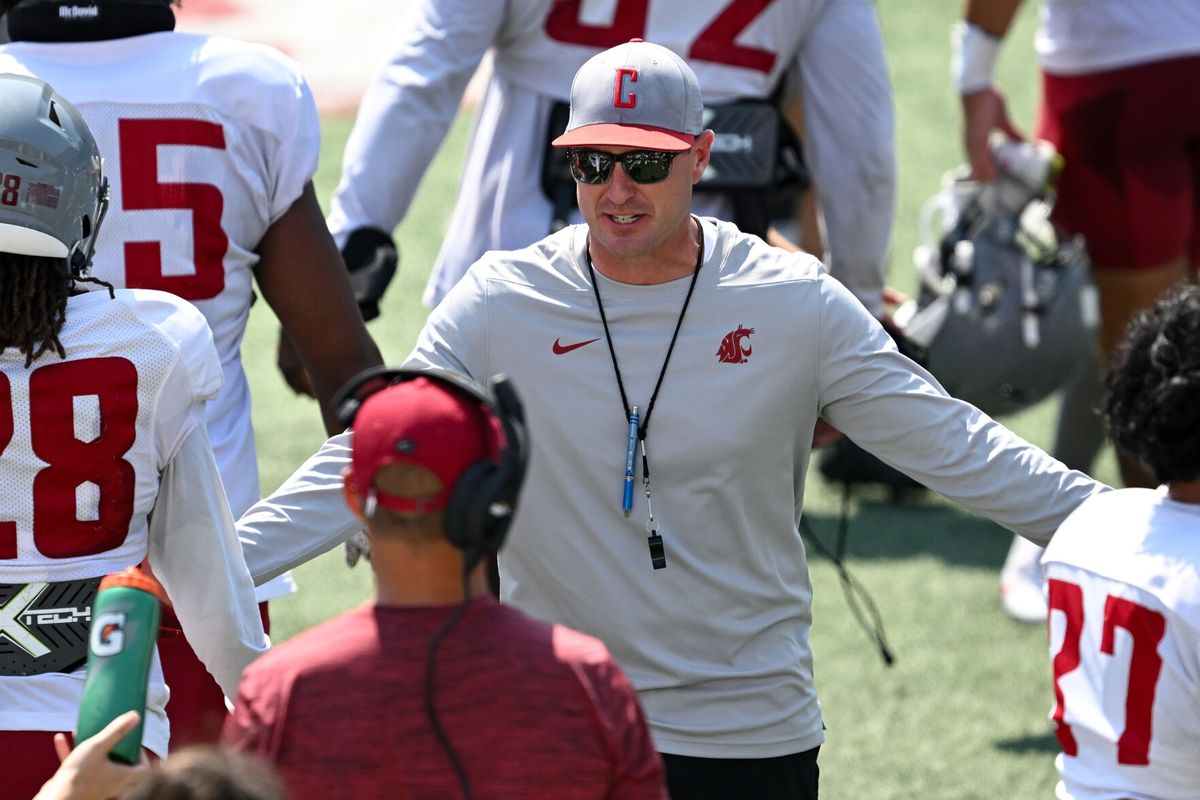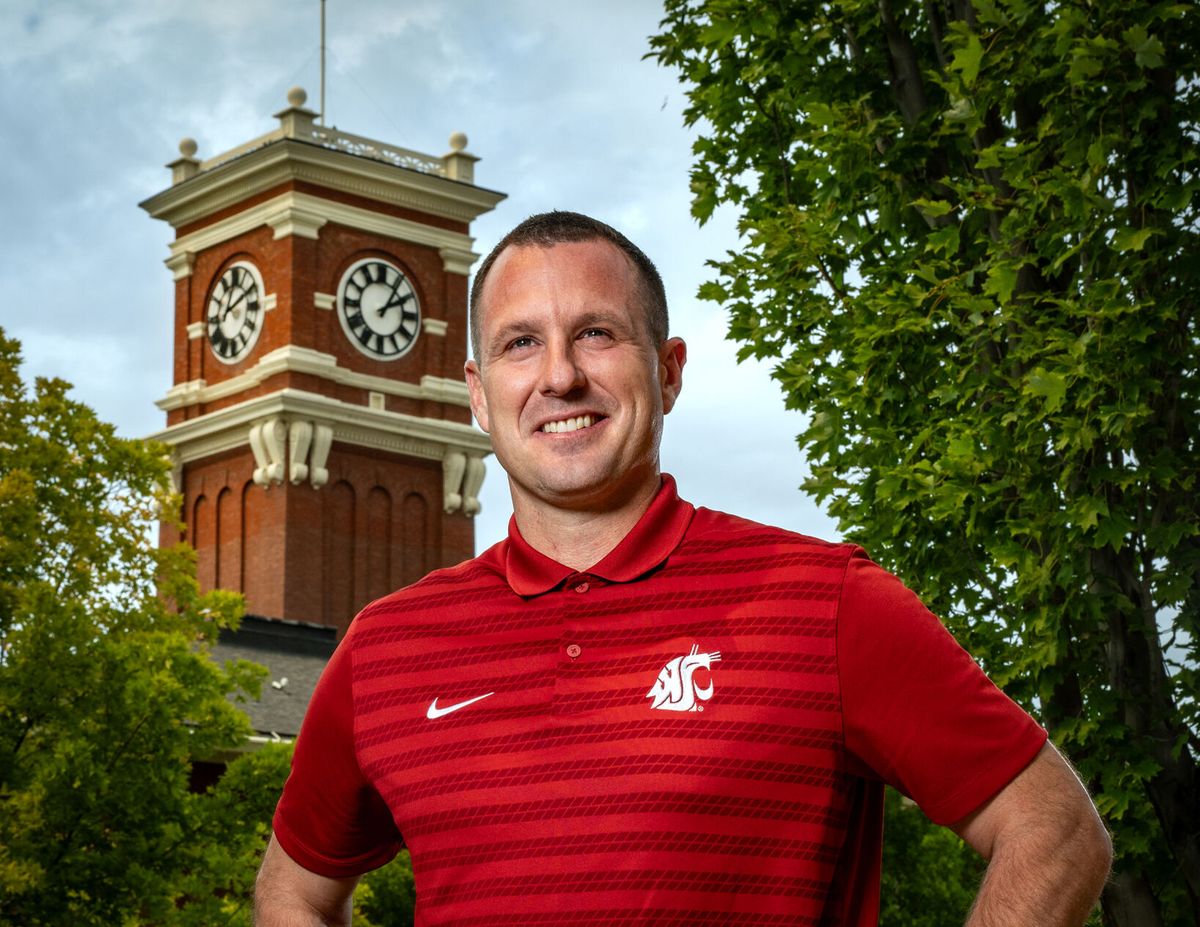As WSU football embarks on an uncertain future, coach Jake Dickert focuses on what he can control: ‘It starts with me.’
Jake Dickert begins his third full season as Washington State football coach. (Colin Mulvany/The Spokesman-Review)
Losses reveal more about a coach than wins.
None more so than a game decided on the final play, against a highly favored rival.
So, to examine the inner workings of coach Jake Dickert, we may review his news conference following Washington State’s dramatic loss to Washington last November.
Dickert’s Cougars had been tied with the No. 4-ranked Huskies until the final play – a 42-yard field goal.
It wasn’t just the last conference rivalry game against the defecting Huskies, who, having escaped with the win over the Cougars, advanced to the national title game.
This was more personal. An upset for the Cougars this day might have been a huge springboard to the future, especially after they had slumped through a six-game losing streak following a brilliant 4-0 start.
Dickert’s pain was obvious as he sat before a microphone that day, rubbing his face and shaking his head. At times, he drummed his knuckles on the table, the audible ellipses buying time, and punctuating his cautious comments.
“I tried to be calculated in that moment,” Dickert said many months later, when asked of his emotions after that loss. “It’s really difficult because how much I try to invest in the players, and wanting it so bad for them, and knowing that was our last time together in that moment …”
He assumed responsibility, and cited a crucial point in the game when he felt he hadn’t been aggressive enough.
But as he continued to try to make sense of the outcome, grief seemed to harden into something more purposeful.
“I see a clear vision of what we can be,” he said. “And I think that future can be really bright.”
At that point, it seemed, he already had started formulating plans for the 2024 season.
And if such losses were to occur in the future, they wouldn’t be the result of his failure to be aggressive.
• • •
Schooled in mathematics, Jake Dickert needs things to add up. And to accomplish that, as in all equations, an order of operations must be followed.
Apple Cup loss and the second-half slump of 2023 fresh in his mind, Dickert made a bold decision. Rather than hit the post-holiday recruiting trail when it reopened, he functionally sequestered his staff in the Cougar Football Complex.
“I took what would normally be a recruiting week for our staff, when we first got back from Christmas break, and said, ‘We’re going to sit in here, together, and watch this season’s film. This is going to be more important than going out and recruiting who’s next, because we need these answers.’ ”
Seven straight days in the office. Grinding. Searching for solutions and corrections. His logic tracks: What would be the point in going out and recruiting new players when they hadn’t first discovered what had gone wrong?
“We were extremely thorough,” Dickert said. “We wanted to hear everyone’s opinion. It needed to be a time of collaboration and ideas. It led to tons of hard conversations, things that needed to be said.”
It did not come without conflict or heated debate. And surely Dickert had to weigh the opportunity cost from missing time in the recruiting wars.
“You create a space where we own this together, and we’ve got to find the answers to why we underachieved,” he said. “Then you clean the slate and move on.”
One proviso: Nobody was allowed to take solace in coming close to beating Washington.
“If you’re an ultimate competitor, you get fed up with people going, ‘Let’s build off a loss.’ No, we lost! (Washington) made the right moves, and I give them credit for that, but it’s important to understand, at Washington State, you don’t want to take a back seat or that little-guy mentality, or take any moral victories. You can’t go down that road.”
• • •
Dickert was following a well-trod path. As his grandfather and father before him, he planned on becoming a small-town teacher and coach.
His graduating class at Kohler (Wisconsin) High had 27 students. He was a member of the National Honor Society and made the Dean’s List, and was a good enough wide receiver to earn all-conference honors when he played at Division III Wisconsin-Stevens Point.
With a degree in secondary mathematics education in hand, his future was plotted. “I loved math ever since I was a little kid,” he said. “It came easy to me. I’m a detail guy – rows and columns, formulas – everything I do is detailed, even now, in an organizational structure.”
Dickert completed his student teaching and landed his first job. But perhaps understanding Jake better than Jake himself, his father made timely mention of a lingering regret he harbored. Although he was enjoying a long and successful career as a teacher, coach and administrator, his father revealed that he always wished he had tried coaching in college.
“The next day, I called up my coach at Wisconsin-Stevens Point and asked if I could be a (graduate assistant) for him,” Dickert said. “He said, ‘Yes,’ and I quit my new job and started off on this crazy career.”
This was 2007, and Dickert literally started on the ground floor, developing a grass-roots perspective of coaching.
“It was the best thing that ever happened to me because when you’re a GA at a D-III school, you’re coaching, but you’re also lining the field, you’re the equipment guy, but you get to recruit, too. It just really shapes you as a coach.”
He GA’ed again the following year at North Dakota State before starting a string of eight seasons as a defensive assistant at various outposts around the Dakotas, Missouri and Minnesota.
Dickert’s facility at shaping and strategizing a defense became increasingly obvious.
Jason Eck, now Idaho’s head coach, recalled the 2013 season when he was coordinating a powerhouse offense at Minnesota State-Mankato. The Mavericks averaged more than 40 points a game while going 11-1, but scored a season-low 20 in a win over Augustana (Sioux Falls).
Eck was so impressed with the Augustana defense that he went over to introduce himself to the defensive coordinator, who had made things so difficult for them. It was Dickert, then just 30 years old.
“We struggled offensively and I was really impressed; they had a good scheme and attack,” Eck said. When the Mankato staff needed a defensive coordinator the next season, Eck quickly recommended Dickert.
They worked together again at South Dakota State in 2016. “I could see he had a really bright future,” Eck said.
• • •
Coach Craig Bohl detected those special qualities in Dickert as early as 2008, when he hired him as a graduate assistant at South Dakota State.
“I could tell, if there were complex questions or abstract thinking that was going to be required, he had a tremendous capability of taking complicated things and making them simple,” Bohl said. “I told him at the time that I was going to hire him someday, but I was going to let somebody else pay for the mistakes he was going to make while he was still learning.”
Bohl kept his word, hiring Dickert to coach safeties for him at Wyoming in 2017, eventually making him defensive coordinator.
“I could tell his intelligence level was really high. As coaches, a lot of times, we’re problem solvers. When you really get into the nuts and bolts of somebody who majors in math at the higher levels, they’re dealing with theoretical problems.”
After retiring from Wyoming, Bohl was named Executive Director of the College Football Coaches Association, so he speaks with authority on the topic of contemporary coaching.
“In today’s world, a head football coach has to be a great communicator,” Bohl said. “If you cannot articulate a really clear vision, you’re not going to last very long. The days of being only a strategic X-and-O guy are gone, you’re now a CEO and you have to be able to move a message within the staff and administrators and the players. He’s really good at that. And I’m very proud of him.”
• • •
Chaos Theory is a branch of mathematics that tries to recognize patterns in events that were once thought entirely random, unpredictable and disordered.
Dickert’s time at Washington State could be included in that field of study. Certainly, his elevation to interim head coach seven games into the 2021 season defied statistical probability. He was picked to replace coach Nick Rolovich, who was fired for refusing to comply with the state’s vaccination mandate.
Dickert got the call from athletic director Pat Chun, telling him he was the interim head coach and he was scheduled to address his team in 20 minutes.
“Fear, doubts, nerves … all those things … it hits you,” Dickert said of that moment. “You go back to your ‘why?’ Well, these kids needed me. That was the guiding principle that allowed us to (step) in there.”
Resilient, and steadfast for Dickert, the Cougars won three of their next five regular-season games, including a 40-13 romp over Washington.
“I’ll never forget that ’21 team,” he said. “The leadership they took, the trusting, going and playing the way they did when they could have just imploded. To stay together like that was really special and unique.”
Now heading into his fifth season at WSU, third as full-time head coach, Dickert has a 15-16 record, and every season has had elements of uncertainty. The compounding variables included the increasing transfer portal movement, name, image and likeness payments for players, and then the disintegration of the Pac-12 Conference.
For now, the Cougs are in an alliance with the Mountain West Conference.
“We have to live with it, we’re in this adversity together and we all have to grow from it, in real time, in front of media, our players, staff, organization,” Dickert said. “You stand on your action.”
• • •
Maybe the rapidly changing college sports environment suits those coaches less entrenched in the historic ways of their predecessors.
“There’s no roadmap, everything is changing so quickly,” Dickert said. “You have to be able to adapt and be crafty and creative. The whole world has flipped on its head the last five years.”
Bohl identified this adaptability in Dickert years ago: “I saw his attention to detail and his uncanny ability to think two steps ahead.”
But when it comes to identifying players suited to WSU and Pullman, Dickert is on the same track as some of his more successful antecedents.
“I don’t want us to take a back seat to anybody, but I do want our identity, to the core, to be blue collar, small-town values, to be lunch-pail/hard-hat tough. You have to be different, you have to love ball, and you have to have an appreciation for the different things that this place provides.”
With the voracious transfer portal ready to gobble up any prospect that the Cougars identify, and may spend years developing, Dickert believes he has to be proactive and transparent with his players.
“It’s a two-way street: If I’m open and honest and we communicate the whole time, I don’t have a problem. Sometimes their talent will allow them to make money that will change their lives. I can’t hold them back from that. These are the conversations you need to have.”
But college football isn’t a guaranteed ticket to riches. And certainly not immediately. Teenagers who arrive on campus have to understand that.
“I did this last year, we bring in freshmen and I show them clips of R.J. Stone, Brennan Jackson and, I believe, Jaden Hicks, when they were true freshmen,” Dickert said of NFL draft picks Jackson and Hicks, and undrafted free agent Stone. “I showed them getting their asses kicked, falling down, because all these young kids see is the All-American, the all-conference players. I show them Brennan’s picture when he first got here, he’s 206 pounds.”
The videos are evidence that development takes years of work and dedication.
“I show them Abe Lucas’ first rep as an offensive lineman, a guy just threw him,” Dickert said of the Seahawks’ third-round draft pick in 2022. “I show them there’s a process here and it takes time, but the world today works in a microwave, and football players go in slow cookers, and that’s a bad mix.”
Another tricky variable at play can be the advice and pressure that might come from young players’ families or advisors.
“These kids now are more professional than ever,” Dickert said. “Can you have grown-man conversations with somebody at 18? I don’t believe they’re ready, but my job is to help them get ready and to teach them those things they’re going to need.”
These are discussions previous generations of coaches never had to manage.
“Players can see through somebody who is being less than honest,” Bohl said. “(Jake) is very authentic, and he was able, in an artful way, to tell players what they needed to hear as opposed to what they wanted to hear. I’m sure that skillset is a real asset for him now that he’s a head coach.”
• • •
Dickert often recycles bromides from his father, and especially loves this one: “Everything you ever want in life is on the other side of hard work.”
He sees these as the lessons of small-town America, the kind of thing that resonates in Pullman, and with the WSU fan base.
“I just believe in that stuff, and I believe it works,” he said.
Football, he said, mirrors those fundamental values.
“It’s so hard, with so many little details you have to get right. Your character is going to be revealed every day. You’re going to get knocked down, and who you are is revealed in that moment. Adversity is life’s greatest teacher. If you’re willing to get uncomfortable, you can grow every day. Football is great because we push you to your limit and you can become greater than you even know you can.”
Bohl said he got a call from Chun when he was vetting Dickert, and vouched for Dickert as ideal for Washington State.
“I know that fit is so important, and I know some things about Pullman,” Bohl said. “He likes it there. There are some challenges there, but he’s embracing those. Some guys have to have glitz and glam, and that’s just not him.”
Having coached in Stevens Point, Fargo, Vermillion, Cape Girardeau, Sioux Falls, Mankato, Brookings and Laramie, Dickert is comfortable on the Palouse.
“Washington State provides a lot of value – family-wise,” he said, noting that on the day of the interview for this story that he was soon headed for his daughter’s theater production, only two minutes away from where he sat.
“You can’t do that in a big city. Those are things you can’t put monetary value on. Those mean the world to me.”
When news broke that the Pac-12 was disintegrating, Dickert immediately assessed the possible effects on the community. His community.
“I know it’s going to affect the hotels, the grocery stores, the restaurants, our campus,” he said.
“I knew it was going to change a lot of things. But I know you can only control what you can control. We need to put all our energy into creating a new future,” he said.
“And it starts with me.”


